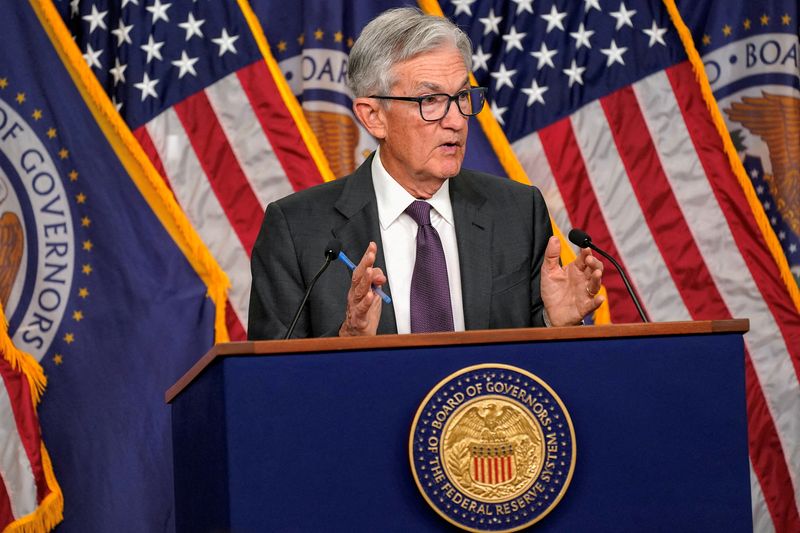Fed’s Powell: Economy slowing in Q1, can wait for greater clarity

By Howard Schneider and Ann Saphir
CHICAGO (Reuters) -U.S. economic growth appears to be slowing, with consumer spending growing modestly, a rush of imports to avoid tariffs likely to weigh on estimates of gross domestic product, and sentiment souring, U.S. Federal Reserve Chair Jerome Powell said on Wednesday.
“Despite heightened uncertainty and downside risks, the U.S. economy is still in a solid position,” Powell said in remarks prepared for delivery at the Economic Club of Chicago. But “the data in hand so far suggest that growth has slowed in the first quarter from last year’s solid pace.”
Outside analysts see growth continuing to slow over the year, while “households and businesses report a sharp decline in sentiment and elevated uncertainty about the outlook, largely reflecting trade policy concerns,” Powell said in reference to the rapid changes in import taxes imposed by President Donald Trump.
Repeating comments made earlier this month, the Fed chief noted that the impact of those and other policy changes “are still evolving,” but likely to be “larger than anticipated” given the scope of the tariffs Trump appears to favor even as negotiations between the U.S. and other countries may eventually lower them.
“As we learn more, we will continue to update our assessment,” particularly about whether any price increases sparked by the tariffs appear to spark only a temporary or a more persistent rise in inflation.
For now, he said, the Fed could keep its benchmark interest rate steady “to wait for greater clarity before considering any adjustments to our policy stance,” Powell said.
The Fed’s benchmark interest rate is currently set in a range between 4.25% and 4.5%, where it has been since December following a series of rate cuts late last year.
Since then progress on restoring inflation to the Fed’s 2% target has slowed.
Despite the uncertainty and back-and-forth nature of Trump’s tariff announcements, a judgment about their likely impact will be central to upcoming Fed debate over whether to leave the benchmark interest rate unchanged, lower it – or even consider rate increases.
“Tariffs are highly likely to generate at least a temporary rise in inflation. The inflationary effects could also be more persistent,” Powell said. “Avoiding that outcome will depend on the size of the effects, on how long it takes for them to pass through fully to prices, and, ultimately, on keeping longer-term inflation expectations well anchored,” an aim Fed officials have begun to emphasize.
While measures of inflation expectations over short-term periods “have moved up significantly,” because of tariffs, Powell said the longer-term expectations that the Fed watches most closely remain consistent with the Fed’s inflation goal.
With the Fed also watching employment, Powell said the labor market remained “in solid condition” and “at or near maximum employment.”
But should the Fed get caught between rising inflation and a rising unemployment rate, “we would consider how far the economy is from each goal, and the potentially different time horizons over which those respective gaps would be anticipated to close.”
(Reporting by Howard Schneider and Ann Saphir; Editing by Andrea Ricci)









